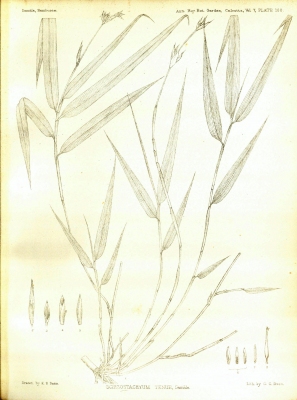Schizostachyum gracile
(Munro) Holttum
Poaceae
Melocanna gracilis Kurz ex Munro
Schizostachyum tenue Gamble
Common Name:
General Information
Schizostachyum gracile is an evergreen bamboo producing a loose clump of culms 3 - 4 metres tall from short, woody rhizomes. The erect to arching, thin-walled, woody culms are 15 - 20mm in diameter with internodes 25 - 30cm long[
310- Title
- Plant Resources of Southeast Asia
- Publication
-
- Author
-
- Website
- http://proseanet.org/
- Publisher
-
- Year
- 0
- ISBN
-
- Description
- Lots of information on the uses of the plants of SE Asia.
].
An attractive ornamental for ponds[
310- Title
- Plant Resources of Southeast Asia
- Publication
-
- Author
-
- Website
- http://proseanet.org/
- Publisher
-
- Year
- 0
- ISBN
-
- Description
- Lots of information on the uses of the plants of SE Asia.
].
Known Hazards
None known
Botanical References
Range
Southeast Asia - Vietnam, Malaysia.
Habitat
Forest, forest margins, wastelands, along roadsides and in swampy areas[
310- Title
- Plant Resources of Southeast Asia
- Publication
-
- Author
-
- Website
- http://proseanet.org/
- Publisher
-
- Year
- 0
- ISBN
-
- Description
- Lots of information on the uses of the plants of SE Asia.
].
Properties
| Habit | Evergreen Bamboo |
| Height | 3.50 m |
| Cultivation Status | Ornamental, Wild |
Cultivation Details
Bamboos have an interesting method of growth. Each plant produces a number of new stems annually - these stems grow to their maximum height in their first year of growth, subsequent growth in the stem being limited to the production of new side branches and leaves. In the case of some mature tropical species the new stem could be as much as 30 metres tall, with daily increases in height of 30cm or more during their peak growth time. This makes them some of the fastest-growing species in the world[
K- Title
- Plants for a Future
- Author
- Ken Fern
- Description
- Notes from observations, tasting etc at Plants For A Future and on field trips.
].
Bamboos in general are usually monocarpic, living for many years before flowering, then flowering and seeding profusely for a period of 1 - 3 years before usually dying.
Edible Uses
None known
Medicinal
None known
Other Uses
None known
Propagation
Seed -
If you have any useful information about this plant, please leave a comment. Comments have to be approved before they are shown here.


 Useful Tropical Plants Database 2014 by
Ken Fern,
web interface by
Ajna Fern
with help from
Richard Morris.
Useful Tropical Plants Database 2014 by
Ken Fern,
web interface by
Ajna Fern
with help from
Richard Morris.